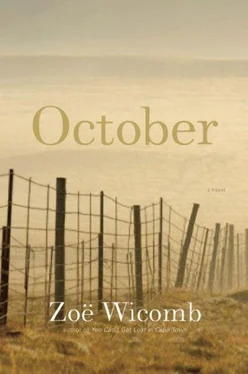After all these years, was the place where he had been raised, the small holding in the Overberg valley where his family lived from hand to mouth, still home for Nicholas? Could that be home when he had not been there for so long, remembered little more than the youthful urge to leave the place? These were questions that plagued him once the children scampered about the stony wastes of Kliprand.
No, Nicholas came to love this land where he had done so well, and where he planned to stay until his dying day. He was nothing but loyal to Kliprand, his place of domicile, but saw no need to abandon his position as outsider. Here, in this remote outpost of Namaqualanders, he could not very well belong. Nomad blood seemed still to course in their veins, for why did they not till the land? Why were they content to toil for low-class Englishmen in the gypsum mines?
How he hated their speech. The dragged vowels and especially the use of ga and hitse, surely Hottentot words, he considered barbaric. How could knowledge be acquired in such a tongue? These people were too — and he appeared to search for the word each time — well, too indigenous, refusing to wash away the stamp of Hottentot origins. In fact, did they not use the excuse of brack water for not washing as often as they should?
Here in Kliprand a few of the old people sang, of all things, hymns in a savage tongue that Jesus surely could not condone, and the young men smoked local dagga and danced the kabarra, a word pronounced with a clicking tongue that Nicholas knew he would never manage. Flushed with shame, he watched the askoek dance, as some preferred to call it. A dusty affair, performed where the fire had died down after the grilling of flatbread, by men leaping high off the ground as they clicked the sides of their feet together, ash flying. His role as Meester was clear. The hotnos ways, the memory of clicks and kabarra and ash, had to be beaten out of the children. To this purpose he lined them up in military fashion, got them to march stiffly in time to his bellow of links-regs, left-right, up and down the dusty rugby field, starting the day with exercises that required straightened limbs and heads held high. Only thereafter the recitation of the alphabet, of times tables and unfathomable poems committed to memory, and the children were soundly thrashed for faltering.
Thus if Nicholas, as his father had taught him, was at one with the land, knowledgeable about its flora and fauna, knew its every undulation, its mounds and troughs, every outcrop of rock, the sparse shrubs, the memory of winter streams in the washed earth — there was nothing dramatic about this landscape — he was not of the place. Yes, he tilled the earth, but holding on to his bootstraps, he also cultivated a necessary distance, an unbelonging. By such means the distant memory of European blood could be kept alive.
The Murrays were of old Scottish stock, people who had settled before the Europeans were corrupted by Africa. A good old colored family, evenly mixed, who having attained genetic stability could rely on good hair and healthy dark skin, not pitch-black like Africans, and certainly nothing like sly Slamse from the east, who were not to be trusted. The Murrays had no further use for European blood, no need for more mixing; they were proud colored people who kept their distance from others. Nicholas shook his head contemptuously at the people of Kliprand who did not mind at all if one of their girls arrived from the white dorp with a blue-eyed baby, the product of cheap relations with a master.
Antoinette too, having been a Malherbe, was of good stock. If theirs had come to be an Afrikaans name, well the Malherbes knew better, knew that it was fighting Huguenot blood that coursed through their veins, infusing them with wholesome Calvinism. When, as a teenager, Mercia tried to correct her father about sly Slamse, pointing out that the slave blood of Cape Malays was also part of their heritage, he dismissed it as foolish ANC propaganda.
Nicholas did not tire of telling his young children the story of how he had pulled himself up by his own bootstraps. That he was one of a large family, of a father who was illiterate, was neither here nor there. The important thing was that that father was visibly of European stock, that he was a God-fearing, clean-living man of the land, even if that land belonged to a boer. For all his disadvantages, he had built with his bare hands a decent house for his family, fed and clothed them, and had never been in debt. Through hard work he gathered an adequate herd of cattle; in other words had set the example of pulling himself up by his own bootstraps. The Murrays, Nicholas said, were a tall and erect people; they held their heads high, and therefore each generation prospered beyond their fathers.
As the children grew older they secretly mocked Nicholas, who checked their postures, and was not past flicking his aapstert at their legs with a clipped Head up, shoulders back. This pulling up by the bootstraps, Jake sniggered, did not make sense. It would surely make of the Murrays a crooked clan, bent over, always fiddling with their boots, anything but erect. He did not fancy the idea of prospering in that contradictory manner. The children noted that Pappa Murray’s grandfather, the great Scotsman, was never mentioned, except in terms of the blood that he had brought. No doubt short and crooked with eating too much oats and lack of sunlight, and a drunkard to boot, Jake conjectured. Clearly Pappa didn’t know him, otherwise there would surely have been aggrandizing stories. Most likely the Scotsman had another legitimate family, besides the children fathered upon his black slave.
Years later, after Jake had lost his job in the wine industry, he taunted Nicholas, drunkenly holding a bottle of wine by the neck, tilting his head and swigging directly from it. Look, he said, no slouching here; I’ve learned to keep my head up. Good Calvinist habit, he laughed, smacking his lips. I drink in honor of our Huguenot forefathers who brought the vine to the Cape, who established our flourishing wine industry on the backs of Namaquas and other qua-quas and slaves and the dop-system of weekly pay in flagons of cheap wine. Jake stumbled about in unlaced shoes. No danger, he declared, of pulling himself up by his bootstraps.
May God forgive you, Nicholas said, bewildered by Jake’s madness. He shut his eyes, and his hands patted various parts of his person, as if in search of the aapstert that would cure all abomination. He spoke with difficulty, a Moses about to stutter his fifth commandment, but was it not too late for that? Instead, it was the story of Noah that would have to guide the boy, a story that Jake had clearly forgotten.
God sent Europeans to darkest Africa, he said, to teach us about moderation. Wine is to be drunk in the manner of Holy Communion, and drunkenness, as the Huguenots well knew from the story of Noah, is an abomination. Noah himself was of course blameless. How could he have known about the effects of wine? What God tells us is that Noah’s son Ham laughed at his father’s nakedness, and that Ham’s descendants were blackened by the curse of Noah. Which places on us, the people of Ham, the burden of redeeming ourselves in the eyes of the Lord.
Nicholas’s voice grew stronger. We may not have in English different verbs for animals’ eating and drinking, it is too civilized a language, but just think, my boy, of the Afrikaans, vreet and suip, the gross words for the ways in which animals consume, words that we also use for the shameful excess of human beings.
Ja, Jake declared, slurring and swaying melodramatically, I am gesuip. And following the Latin conjugations that we learned from an aapstert, here it goes: You are gesuip / He/she/it is gesuip / We are gesuip / You are gesuip / They are gesuip. But tell me, he hiccupped, tell me, Grootbaas, do you know what Malherbe actually means?
Читать дальше












